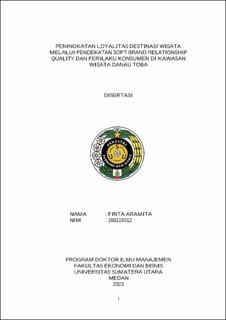| dc.contributor.advisor | Rini, Endang Sulistya | |
| dc.contributor.advisor | Sembiring, Beby Karina Fawzeea | |
| dc.contributor.advisor | Lumbanraja, Prihatin | |
| dc.contributor.author | Aramita, Finta | |
| dc.date.accessioned | 2024-03-18T06:05:14Z | |
| dc.date.available | 2024-03-18T06:05:14Z | |
| dc.date.issued | 2023 | |
| dc.identifier.uri | https://repositori.usu.ac.id/handle/123456789/92509 | |
| dc.description.abstract | The tourism sector is considered to be the sector that plays the biggest role in efforts to increase Indonesia's foreign exchange and employment. The tourism sector has an important role in Indonesia's future development. Tourism is a sector that contributes greatly to economic growth while providing the largest foreign exchange contribution in Indonesia, even in many countries in the world. The tourism sector, especially Lake Toba, requires the role of the loyalty of Lake Toba visitors. The existence of basic concepts such as self identification, soft brand relationship quality, and destination brand attachment plays a role so that further studies need to be carried out in an effort to increase visitor loyalty after consumption of tourism services. This study aims to build a model for increasing the loyalty of Lake Toba tourist destinations through the Soft Brand Relationship Quality and Consumer Behavior approaches. The type of research used in this research is explanatory study. The population in this study were visitors to the Lake Toba tourist area which was included in six Key Tourism Area (KTA) areas with a sample size of 190 people. The data analysis method used descriptive statistical analysis and inferential statistical analysis, namely SEM (Structural Equation Model) with the SmartPLS analysis method. The results of direct hypothesis testing show that destination brand attachment has a positive and significant effect on destination loyalty. Self identification has a positive and insignificant effect on destination brand attachment and destination loyalty. Furthermore, self identification has a positive and significant effect on soft brand relationship quality. Then soft brand relationship quality also has a positive and significant effect on destination brand attachment and destination loyalty. Furthermore, from the indirect test results that self identification has a positive and significant effect on destination loyalty through soft brand relationships. However, from the results of indirect hypothesis testing that self identification has a positive and insignificant effect on destination loyalty through destination brand attachment. And soft brand relationship quality has a positive and significant effect on destination loyalty through destination brand attachment. | en_US |
| dc.language.iso | id | en_US |
| dc.publisher | Universitas Sumatera Utara | en_US |
| dc.subject | Self Identification | en_US |
| dc.subject | Soft Brand Relationship Quality | en_US |
| dc.subject | Destination Brand Attachment | en_US |
| dc.subject | Destination Loyalty | en_US |
| dc.subject | SDGs | en_US |
| dc.title | Peningkatan Loyalitas Destinasi Wisata Melalui Pendekatan Soft Brand Relationship Quality dan Perilaku Konsumen di Kawasan Wisata Danau Toba | en_US |
| dc.type | Thesis | en_US |
| dc.identifier.nim | NIM198115012 | |
| dc.identifier.nidn | NIDN0013056205 | |
| dc.identifier.nidn | NIDN0012107402 | |
| dc.identifier.nidn | NIDN0013105907 | |
| dc.identifier.kodeprodi | KODEPRODI61001#Ilmu Manajemen | |
| dc.description.pages | 305 Pages | en_US |
| dc.description.type | Disertasi Doktor | en_US |





